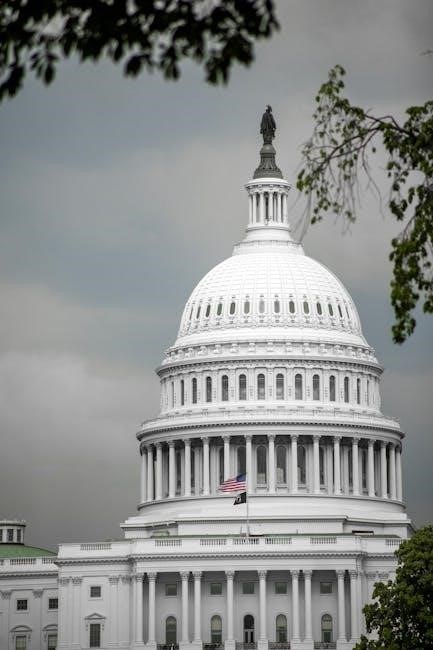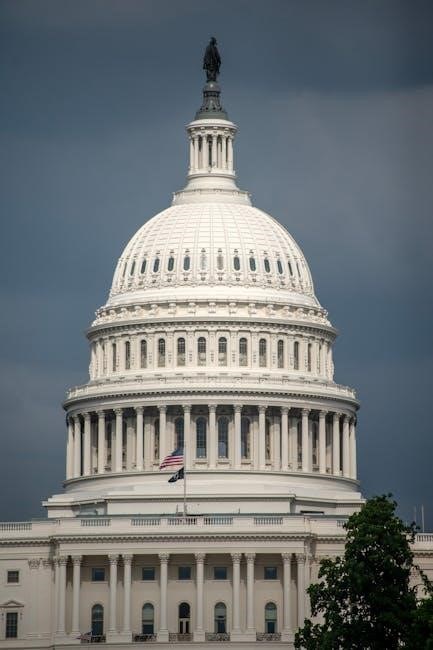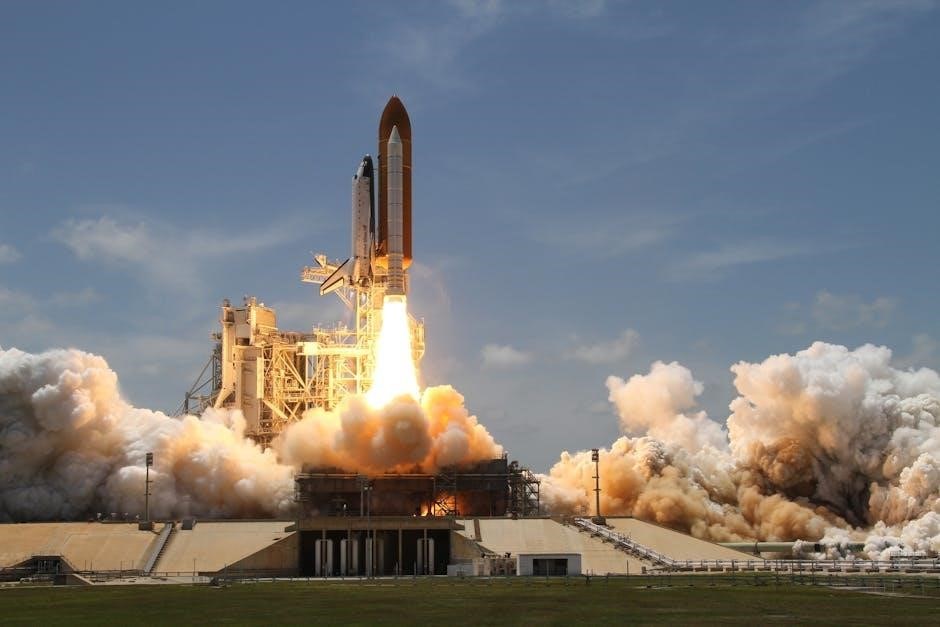1.1 Definition and Scope of American Historiography
American historiography examines how historians interpret U.S. history, focusing on themes like politics, culture, and society. It analyzes historical narratives, methodologies, and debates, shaping our understanding of the past.
American historiography refers to the study of how historians interpret and analyze U.S. history, focusing on themes like politics, culture, and society. It examines historical narratives, methodologies, and debates, offering insights into how perspectives on the past have evolved. This field also explores the cultural and political values influencing historical writing, providing a framework for understanding diverse interpretations of American history and its significance in shaping contemporary discourse.
1.2 The Evolution of Historical Writing in America
The evolution of historical writing in America reflects shifting methodologies and perspectives. Early works, often by amateur historians, focused on national pride and narrative storytelling. By the 19th century, figures like George Bancroft brought a more systematic approach. The 20th century saw the rise of professional scholarship, with historians adopting diverse frameworks, from Progressive to Consensus and New Left schools. This transformation expanded the scope of historical inquiry, incorporating social, cultural, and political dimensions, enriching the understanding of America’s past.
Major Schools of Thought in American Historiography
American historiography is shaped by distinct schools of thought, including the Progressive, Consensus, and New Left approaches. Each school offers unique perspectives on historical interpretation and analysis.
2.1 The Progressive School: Key Characteristics and Historians
The Progressive School emphasizes the role of economic and social forces in shaping American history. Historians like Charles Beard and Vernon Parrington focused on class struggles and the impact of industrialization. This school critiqued capitalism and highlighted the experiences of marginalized groups. It emerged in the early 20th century, challenging Romantic views of history and advocating for reform. The Progressive approach laid the groundwork for later schools, such as the New Left, by prioritizing social justice and structural analysis.
2.2 The Consensus School: Emphasizing Unity in American History
The Consensus School stresses the shared values and cultural unity of Americans, downplaying social and economic conflicts. Historians like Daniel Boorstin and Richard Hofstadter argued that American history is defined by broad agreement on principles like democracy and individualism. Emerging in the mid-20th century, this perspective countered Progressive and New Left critiques, offering a more harmonious view of the nation’s past. It sought to reconcile diverse groups under a common historical narrative, reflecting Cold War-era ideals of national cohesion and stability.
2.3 The New Left School: Radical Perspectives on American History
The New Left School emerged in the 1960s, offering radical critiques of American history; Historians like Howard Zinn and Gabriel Kolko emphasized class struggle, racial inequality, and imperialism. This perspective challenged the Consensus School’s harmonious view, instead highlighting exploitation and resistance. The New Left focused on marginalized voices, advocating for a more inclusive and critical understanding of the past. Their work transformed historiography by prioritizing social justice and questioning dominant narratives about American progress and exceptionalism.
Influential Historians in American Historiography
George Bancroft, Francis Parkman, William Prescott, and John Lothrop Motley were 19th-century historians who shaped historical narratives, emphasizing nationalism, exploration, and cultural identity in their works.
3.1 George Bancroft: The 19th Century’s Most Influential Historian
George Bancroft, a 19th-century scholar, became America’s most influential historian, known for his 10-volume A History of the United States. Educated at Göttingen, he brought a rigorous approach to historical research. Bancroft’s work emphasized democracy and American exceptionalism, blending patriotism with scholarly detail. His narratives celebrated national progress, shaping public and academic perceptions of U.S. history. Bancroft’s legacy endures as a foundational figure in American historiography, blending intellectual rigor with a passionate commitment to the American story.
3.2 Francis Parkman, William Prescott, and John Lothrop Motley: Founders of American Historical Writing
Francis Parkman, William Prescott, and John Lothrop Motley were pioneers in American historical writing, blending literary style with scholarly research. Parkman’s France and England in North America detailed colonial conflicts, while Prescott focused on Spanish conquests in works like The Conquest of Mexico. Motley’s The Rise of the Dutch Republic explored European influences. Their meticulous research and engaging narratives set high standards, establishing American history as a respected academic field and inspiring future historians with their innovative approaches. Their works remain foundational in American historiography.

Contemporary Debates and Trends in American Historiography
Contemporary American historiography engages with debates like the 1619 Project, emphasizing slavery’s role in shaping the nation. Social history and digital tools are reshaping research, fostering diverse perspectives and methodological innovation, while addressing challenges in interpreting the past for modern audiences.
4.1 The 1619 Project: A Modern Perspective on American History
The 1619 Project reframes American history by centering slavery and its legacy as foundational to the nation’s identity. Initiated by Nikole Hannah-Jones, it challenges traditional narratives, sparking debates about race, capitalism, and democracy. Critics argue it distorts historical accuracy, while supporters see it as a necessary corrective to overlooked truths. The project has reshaped public discourse, influencing education and memory, emphasizing the enduring impact of slavery on contemporary America, and prompting a reevaluation of historiographical approaches.
4.2 The Role of Social History in Shaping Modern Historiography
Social history has transformed modern historiography by emphasizing the experiences of ordinary people, marginalized groups, and cultural dynamics. It shifts focus from elites to broader societal trends, offering a more inclusive understanding of the past. This approach has enriched historical narratives, highlighting how social structures and identities shape events. By prioritizing diverse voices, social history challenges traditional perspectives, fostering a more nuanced and comprehensive view of American history and its complexities.
The Role of Historiography in Understanding American History
Historiography provides context and perspective, revealing how interpretations of the past evolve. It exposes shifting viewpoints, enabling a deeper understanding of historical events and their cultural significance.
5.1 Historiography as a Reflection of Cultural and Political Values
American historiography mirrors cultural and political values, as historians’ interpretations often align with or challenge dominant ideologies. For instance, the Progressive School emphasized social reform, while the Consensus School highlighted national unity. The 1619 Project reflects contemporary debates on race and slavery, illustrating how historiography evolves with societal values. These shifts reveal how historical narratives are shaped by the cultural and political contexts of their time, influencing public perception and academic discourse.
5.2 The Importance of Historiographical Analysis in Academic Discourse
Historiographical analysis is crucial in academic discourse as it fosters critical thinking about historical interpretations. By examining diverse perspectives and methodologies, scholars gain insight into how historical narratives evolve. This approach encourages the evaluation of sources, biases, and cultural influences, promoting a deeper understanding of historical events. It also highlights the role of historians in shaping public memory and education, ensuring a nuanced and informed engagement with the past in contemporary debates and research.

The Development of Historical Studies in America
Historical studies in America evolved from amateur efforts to professional scholarship, with the 19th century marking a shift toward systematic research and academic rigor.
6.1 From Amateur Historians to Professional Scholarship
The development of historical studies in America transitioned from amateur historians to professional scholarship, marked by the rise of universities and academic rigor. Early historical writing was often anecdotal and lacking in critical analysis. By the 19th century, historians like George Bancroft and Francis Parkman began adopting more systematic approaches, influenced by European scholarship. This shift laid the groundwork for history as a formal discipline, with graduate programs and professional networks emerging. The establishment of journals and historical societies further institutionalized the field, fostering debates and innovative research.
6.2 The Professionalization of History as a Discipline
The professionalization of history as a discipline in America involved the establishment of standardized methodologies, academic credentials, and institutional frameworks. By the late 19th century, universities began offering graduate degrees in history, emphasizing archival research and objectivity. Professional organizations like the American Historical Association (AHA) were founded to promote scholarly standards and collaboration among historians. This period also saw the rise of specialized journals, fostering debates and advancing historiographical trends that continue to shape the field today.

The Historiography of Specific Periods in American History
American historiography explores diverse interpretations of specific periods, such as colonialism, the Revolution, and nationalism, reflecting evolving perspectives and methodologies among historians over time.
7.1 Colonial Era and the American Revolution: Historiographical Perspectives
American historiography of the colonial era and Revolution has evolved significantly. Early historians romanticized the period, emphasizing patriotism and democracy. Progressive historians later highlighted economic and social tensions, while Consensus scholars stressed unity. Recent interpretations incorporate diverse voices, such as Indigenous peoples and women, offering a more nuanced understanding of colonial interactions and revolutionary ideals. These shifting perspectives reflect broader cultural and political changes, enriching our comprehension of America’s foundational period.
7.2 The National Period and the Age of Exploration: Interpretations and Debates
The National Period and Age of Exploration in American historiography are marked by debates over westward expansion and its impact. Traditional views celebrated frontier ideals and nationalism, while revisionist scholars criticized imperialism and the displacement of Native Americans. Recent studies integrate environmental and cultural histories, offering a more comprehensive analysis of exploration’s consequences. These interpretations reflect ongoing discussions about identity, power, and the legacy of expansion in shaping the nation’s development and consciousness.

The Impact of Historiography on Public Memory and Education
Historiography shapes public memory by influencing how historical events are remembered and interpreted. It impacts education by framing curriculum and debates, reflecting societal values and cultural priorities;
8.1 The Role of Historiography in Shaping Public Memory
Historiography significantly influences public memory by framing how historical events are interpreted and remembered. Dominant narratives shape cultural identity and collective consciousness, often reflecting societal values. Shifts in historiographical perspectives, such as the 1619 Project, challenge traditional views, altering public memory. These interpretations not only define national identity but also inform contemporary debates, making historiography a powerful tool in shaping societal perceptions of the past.
8.2 Historiography in Educational Contexts: Challenges and Opportunities
Historiography in education faces challenges like curriculum constraints and varying interpretations of historical events. However, it offers opportunities to foster critical thinking by exposing students to multiple perspectives. Modern approaches, such as incorporating digital tools, enhance engagement and understanding. Historiographical analysis encourages students to question sources and narratives, preparing them for informed civic participation and intellectual discourse in an increasingly complex world.
The Future of American Historiography
American historiography’s future lies in digital methodologies and interdisciplinary approaches, offering deeper insights into historical narratives while embracing diversity and inclusivity in scholarly research and public discourse.
9.1 Emerging Trends and Methodologies in Historical Research
Emerging trends in American historiography include the integration of digital methodologies, such as computational analysis and big data, to uncover new historical insights. There is also a growing emphasis on interdisciplinary approaches, blending history with fields like sociology and environmental studies. Additionally, scholars are prioritizing diverse and inclusive narratives, incorporating voices from marginalized communities. These innovations are reshaping how historians interpret the past, offering a more comprehensive understanding of American history and its global connections. The 1619 Project exemplifies this shift toward reimagining historical frameworks.
9.2 The Challenges of Digital Historiography in the Modern Age
Digital historiography faces challenges such as data overload, interpretative biases in computational tools, and the need for specialized technical skills. Historians must also address issues of source reliability and ethical concerns in digital archives. Additionally, the rapid evolution of technology creates pressures to adapt methodologies continuously. Balancing traditional historical rigor with digital innovation remains a significant challenge, requiring historians to critically evaluate both the benefits and limitations of digital approaches in their research.

